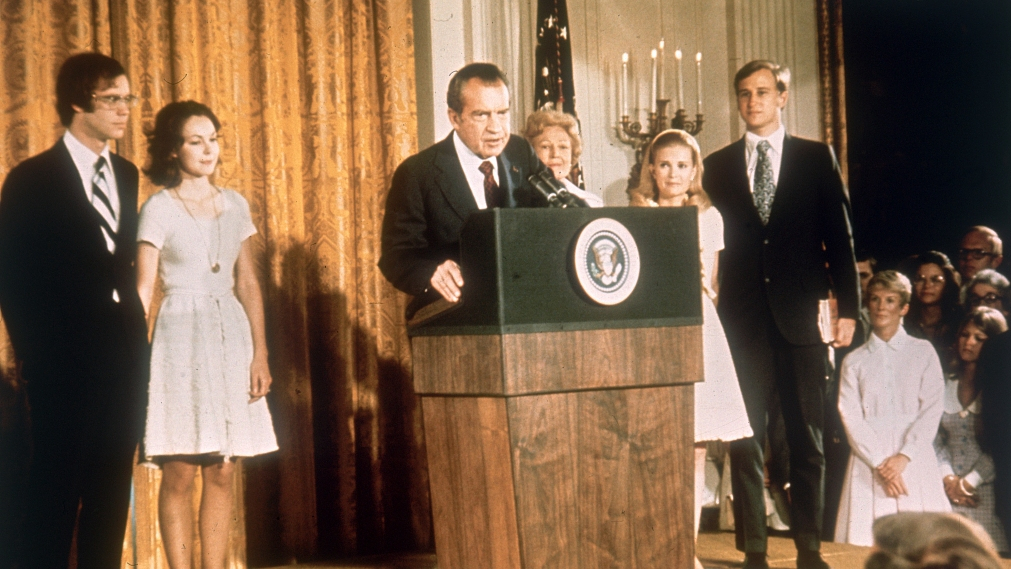Leading Democrats have invited President Donald Trump to testify in the ongoing impeachment inquiry, as a key week of public testimony – including a potentially pivotal appearance from Ambassador to the European Union Gordon Sondland – begins in Washington.
Democrats accused Trump of bribery last week for having his aides dangle a White House meeting and security assistance to Ukrainian President Volodymyr Zelensky, if he announced an investigation into Democratic 2020 political rival Joe Biden.

Speaker of the House Nancy Pelosi holds a news conference at the U.S. Capitol, Washington, D.C., November 14, 2019. /VCG Photo
Speaker of the House Nancy Pelosi holds a news conference at the U.S. Capitol, Washington, D.C., November 14, 2019. /VCG Photo
Trump insists he did nothing wrong and claims the process is both politically motivated and stacked against him.
What have Democrats said?
House of Representatives Speaker Nancy Pelosi told CBS on Sunday that Trump "could come right before the committee and talk, speak all the truth that he wants if he wants" following the president's claim that the process was unfair.
"If he has information that is exculpatory, that means ex, taking away, culpable, blame, then we look forward to seeing it," she added.
Read more:
Pence aide: Trump's Ukraine phone call 'unusual'
Yovanovitch 'intimidated' as Trump live-tweets hearing
Senate Democratic leader Chuck Schumer later questioned why the White House is preventing witnesses from testifying, asking "What is he hiding?"
"If Donald Trump doesn't agree with what he's hearing, doesn't like what he's hearing, he shouldn't tweet," Schumer told reporters. "He should come to the committee and testify under oath."
Why is Pelosi comparing Trump to Nixon?
Pelosi also amplified her unfavorable comparison of Trump to fellow Republican Richard Nixon, saying that the disgraced president at least cared enough about the country to leave office before his impeachment.
On Sunday Pelosi again alluded to Nixon's resignation after the Watergate scandal involving a break-in at Democratic Party headquarters and the subsequent cover-up.

Richard Nixon at the White House with his family after his resignation as U.S. president, August 9, 1974. /VCG Photo
Richard Nixon at the White House with his family after his resignation as U.S. president, August 9, 1974. /VCG Photo
"I mean, what the president did was so much worse than even what Richard Nixon did, that at some point Richard Nixon cared about the country enough to recognize that this could not continue," Pelosi told CBS.
The Nixon comparison came amid the conviction of longtime Trump ally Roger Stone, a self-proclaimed "dirty trickster" who worked for Nixon's re-election campaign and has the former president's face tattooed on his back.
What's happening this week?
The House Intelligence Committee is set to begin a second week of public hearings as part of its inquiry, including quizzing Sondland, Trump's ambassador to the EU.
Sondland is one of the few individuals who had direct conversations with the president about the Ukraine situation to have cooperated with the inquiry.
Tim Morrison, a former National Security Council aide, Jennifer Williams, an aide to Vice President Mike Pence, Alexander Vindman, the director for European affairs at the National Security Council (NSC), and Kurt Volker, the former U.S. special envoy to Ukraine, will speak to the inquiry on Tuesday.
On Wednesday the committee will hear from Sondland, Laura Cooper, a deputy assistant secretary of defense, and David Hale, a State Department official. Fiona Hill, a former top NSC staffer for Europe and Russia, will appear on Thursday.
(With input from Reuters)